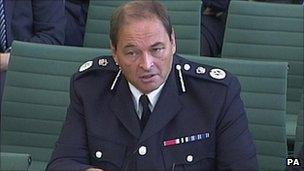West Midlands Police Authority discusses cuts to force
- Published

Chief Constable Chris Sims said the force would be a "leaner, more efficient operation" in future
The plans represent the biggest change to policing in the history of the West Midlands police force.
It sets out in broad terms a radical shake up and change in working practices with the introduction of partnerships from the private sector.
The unions are describing it as privatisation of policing and the break up of the police family in the West Midlands.
'Radical change'
The chief constable said he saw it as a transformation.
So what is happening and why?
Over the next four years the police budget in the West Midlands has to lose £126m.
The force has already reduced its budget by £40m and lost some 1,000 police staff posts. But it needs to cut deeper; £38m must go in next year's budget.
Chief Constable Chris Sims has had to look afresh at ways of matching the savings now required by central government and planning long-term in an era when budgets are not likely to grow.
He said: "We've been looking at the way we're organised - the systems, the technology and we're now moving into some more radical if you like transformation.
"The proposal to consider working with the private sector really represents a step change in the way we're organised and an opportunity to radically change and transform the way we operate."
Officer redeployment
Bearing in mind that 80% of the police authority budget is made up of police pay, it means that staff, training and deployment of resources all have to be squeezed.
The Police Federation, which represents rank and file officers up to the grade of inspector, said it viewed the proposals with extreme disquiet.
The federation claims the changes in the short-term will mean 65 fewer traffic officers and eight less dog handlers.
These posts are not being lost, merely redeployed.
Andy Gilbert, chairman of the Police Federation, said he was unhappy because of what he saw as a lack of consultation.
'Less public service'
He said: "In real terms what this means is less traffic officers on the roads, so that's not going to help in reducing criminality or making the roads safer.
"It's going to mean less dog handlers and less police dogs.
"Now in certain circumstances a dog handler and a dog can be worth 10 officers.
"In reality what this means is less of a service to the public. The only thing you get for less is less."
The immediate loss is a reduction of 390 posts made up of 173 police officers and 217 police staff.
It is expected that 88 people will face compulsory redundancies by the end of March 2012.
Mr Sims said the politicians had set the budget and his job was to make it work. But what will the public get from this new look force?
The chief constable was emphatic.
He said: "We'll still have the ability to do the serious business of counter terrorism, public order and organised crime.
"It will be a well supported organisation but it will be leaner and more efficient."
- Published30 September 2011
- Published21 July 2011
- Published24 January 2011
- Published12 January 2011